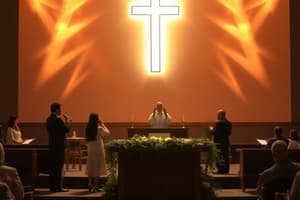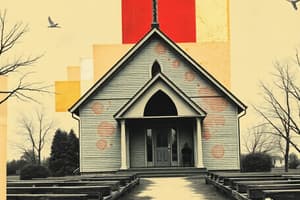Podcast
Questions and Answers
Andrew DeLaney's decision to leave Ireland was primarily driven by what?
Andrew DeLaney's decision to leave Ireland was primarily driven by what?
- Economic hardship and the promise of immediate wealth in America.
- Disagreements with his aunts over inheritance matters.
- A family feud that made it unsafe for him to remain in Ballynakill.
- A desire to escape the perceived dullness and limitations of his village. (correct)
How did Andrew DeLaney manage to get to America?
How did Andrew DeLaney manage to get to America?
- He was sponsored by a wealthy relative already living in New York.
- He secured a formal invitation and paid for his passage.
- He worked as a seaman to earn his passage.
- He stowed away on a ship, aided by sympathetic passengers. (correct)
What detail showcases Andrew DeLaney's integrity later in his life?
What detail showcases Andrew DeLaney's integrity later in his life?
- He founded a successful business in Lynchburg, Ohio.
- He served as an officer under General George Washington.
- He attempted to repay the shipping company for his passage. (correct)
- He became a prominent lay preacher in the Methodist church.
The author's mother's reaction to seeing 'DeLaney's Saloon' in Cork reveals what about her?
The author's mother's reaction to seeing 'DeLaney's Saloon' in Cork reveals what about her?
What was the significance of visiting Ballynakill for the author's mother?
What was the significance of visiting Ballynakill for the author's mother?
Why did the author and his wife travel to Whisendine, England?
Why did the author and his wife travel to Whisendine, England?
What does the anecdote about Thomas 'Squire' Peale and his brother Wilson reveal about them?
What does the anecdote about Thomas 'Squire' Peale and his brother Wilson reveal about them?
In what capacity did Samuel Peale serve during the Civil War?
In what capacity did Samuel Peale serve during the Civil War?
The author's grandmother, Laura Fulton, had a father who was highly regarded as what?
The author's grandmother, Laura Fulton, had a father who was highly regarded as what?
What was the author's emotional state while waiting for the birth of his first child?
What was the author's emotional state while waiting for the birth of his first child?
How did the author describe the atmosphere in his house?
How did the author describe the atmosphere in his house?
What made Alice Brown, the Jamaican lady, so special to the family?
What made Alice Brown, the Jamaican lady, so special to the family?
How did the author involve his children in solving problems?
How did the author involve his children in solving problems?
What was unique about the author's storytelling to his children?
What was unique about the author's storytelling to his children?
How did the author's children react when he misremembered a detail in his made-up stories?
How did the author's children react when he misremembered a detail in his made-up stories?
What was the significance of the family pew in church?
What was the significance of the family pew in church?
What did Elizabeth do to make her father laugh while he was in the pulpit?
What did Elizabeth do to make her father laugh while he was in the pulpit?
What behavior did Margaret exhibit during sermons that caused a 'riot' in the congregation?
What behavior did Margaret exhibit during sermons that caused a 'riot' in the congregation?
How did John react to the criticism of his father's work during his time at the seminary?
How did John react to the criticism of his father's work during his time at the seminary?
What was the primary reason for the family's directed travel around the world?
What was the primary reason for the family's directed travel around the world?
What did the children do on train trips that resulted in 'shambles'?
What did the children do on train trips that resulted in 'shambles'?
What caused Elizabeth to be inconsolable on a train trip through the Canadian Rockies?
What caused Elizabeth to be inconsolable on a train trip through the Canadian Rockies?
What strategy did Mrs. Poling use to help her children evaluate potential partners?
What strategy did Mrs. Poling use to help her children evaluate potential partners?
What career path did Margaret's husband, Paul Everett, choose after a spiritual experience?
What career path did Margaret's husband, Paul Everett, choose after a spiritual experience?
What role did Elizabeth unexpectedly play that led to her marriage?
What role did Elizabeth unexpectedly play that led to her marriage?
What vivid memory does the author share about visiting his parents in Canisteo?
What vivid memory does the author share about visiting his parents in Canisteo?
What common thread runs through anecdotes shared about the author's family?
What common thread runs through anecdotes shared about the author's family?
The story of the church congregation enjoying the smiles between the author and Elizabeth in the balcony highlights what aspect of their relationship?
The story of the church congregation enjoying the smiles between the author and Elizabeth in the balcony highlights what aspect of their relationship?
Who was the father of Lydia, John's wife?
Who was the father of Lydia, John's wife?
Flashcards
Energy
Energy
A dynamic quality that fuels enthusiasm and action.
Excitement
Excitement
A strong feeling of excitement; a key ingredient for a fulfilling life.
Enthusiasm
Enthusiasm
Intense enjoyment and eagerness.
Andrew DeLaney
Andrew DeLaney
Signup and view all the flashcards
Thought
Thought
Signup and view all the flashcards
Integrity
Integrity
Signup and view all the flashcards
Ballynakill
Ballynakill
Signup and view all the flashcards
Robert Fulton
Robert Fulton
Signup and view all the flashcards
England
England
Signup and view all the flashcards
Family
Family
Signup and view all the flashcards
Study Notes
- The Stafford and Peale families, along with the Crosbys and DeLaneys, were known for their excitement, enthusiasm, and energy.
Andrew DeLaney
- Andrew DeLaney, the author's maternal grandfather, was raised by two maiden aunts in Ballynakill, Ireland.
- He dreamed of sailing to America, a dream he secretly pursued by leaving home with only a few shillings.
- He left a note for his aunts expressing his need to leave and his love for them.
- Andrew stowed away on a ship to America, aided by sympathetic women passengers who hid him and provided food.
- Upon arriving in America, he secured employment in Lynchburg, Ohio and eventually married Margaret Potts, who came from a Pennsylvania family with ties to the Revolutionary War.
- Margaret Potts converted Andrew to Methodism and he became a respected citizen in Highland County.
- The author remembers Andrew DeLaney as a tall, stately man with white hair and a white beard.
- Andrew DeLaney's legacy continued with the birth of the author's grandson, Andrew Peale Allen.
- The author and his wife took the author's parents to Ireland, fulfilling his mother's dream to see her father's birthplace.
- During the Ireland trip, they visited Ballynakill and found Andrew DeLaney's baptism record at the local Catholic church.
Stafford Family
- The Stafford family originated in England and later settled in Canada.
- Dr. Frank Stafford researched the family history.
- The author and his wife visited Whisendine, the village in England from which the Staffords emigrated.
- They photographed Stafford tombstones and visited an elderly Stafford family member.
Peale Family
- The Peale family also traces its roots to England.
- The family name has been spelled Peel, Piel, Peele, and Peale.
- There's a distant connection to Sir Robert Peel, who created the London police force.
- Thomas Peale, or Squire Peale, was an early settler in Lynchburg, Ohio.
- Samuel Peale, the author's grandfather, was a Civil War veteran who served in an Ohio regiment.
Ruth's Family
- Ruth's parents were Canadian.
- Her mother, Loretta Crosby, was born in Markham, Ontario, and her father, Frank Burton Stafford, was born in Elora, Ontario.
- Ruth was born in Fonda, Iowa, and has two brothers, Charles and William Stafford.
- Frank Burton Stafford was a minister in Iowa and Detroit.
- Loretta Crosby was a woman of great strength and love.
Author's Family
- The author's family is descended from a long line of Fultons, with the name Robert Fulton recurring in each generation.
- His grandmother was Laura Fulton, and her father, Dr. Robert Fulton, was a prominent physician and lay preacher.
- Ancestry traces back to Robert Fulton, inventor of the steamboat.
Birth of Margaret
- The author's eldest daughter, Margaret, was born on November 17, 1933, in New York City.
- The author humorously recalls the anxious waiting period during Ruth's labor.
Birth of John
- Son John Stafford Peale was born September 2, 1936 at the French Hospital.
- The author was sent away to work on his sermon.
- John's baptism was featured in Life magazine, titled "Three Generations."
Birth of Elizabeth
- Daughter Elizabeth Ruth was born Six years later on July 22, 1942, in Olean, New York.
- She was born during a flash flood.
- A photo of Elizabeth at one day old shows her making the V-for-Victory sign.
Family Life
- The family enjoyed a close-knit, exciting, and busy life.
- Dinner conversations were lively and often involved seeking advice on problems presented in counseling sessions.
- The author created original stories for his children, including "Larry, Harry, Perry, and Their Magic Airplane" and "Jake the Snake."
- The children were actively involved in church, though they initially resisted sitting in the "Pastors" pew.
- The author had a habit of exchanging smiles with Elizabeth during sermons, which the congregation enjoyed.
Children's Education and Careers
- John graduated from Deerfield Academy and Washington and Lee University.
- He went on to study philosophy and theology, receiving a Ph.D. from the University of North Carolina.
- Margaret graduated from Friends Seminary and was Phi Beta Kappa at Ohio Wesleyan University, she married Paul F Everett.
- Elizabeth married John Allen and is involved in church and community affairs.
Family Travel
- The family prioritized travel to broaden their children's horizons.
- One of their first trips was to national parks in the western United States, traveling by train.
- During a trip on the Canadian Pacific Railroad, Elizabeth lost a shoe out the window of the train.
Children's Marriages
- The author references Mrs. Daniel A. Poling's method of introducing potential partners to the family for an extended stay.
- John married Lydia Woods, the daughter of missionaries.
- Margaret married Paul F. Everett, a Presbyterian minister, after he had a life-changing experience at Marble Collegiate Church.
- Elizabeth married John Allen, a vice-president at the Reader's Digest.
Memories of Parents
- The author recounts a touching memory of visiting his parents in upstate New York on a snowy winter night.
- The memory emphasizes the deep love and fundamental values of family.
- A happy, loving, and exciting family is the dearest of all human relationships.
Studying That Suits You
Use AI to generate personalized quizzes and flashcards to suit your learning preferences.





